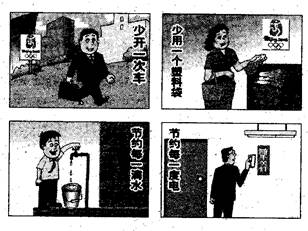题目内容
第Ⅱ卷 非选择题部分(共三节,45分)
注意事项:
用黑色字迹的签字笔或钢笔将答案写在答题纸上,不能答在试题卷上。
第四部分:写作(共三节,满分45分)
第一节:单词拼写(共l0小题;每小题1分。满分10分)
76. Billy,it’s bad m__________ to talk with your mouth full.
77. Now there are no dinosaurs e__________ on the earth.
78. It is o_________ that a healthy diet does us a lot of good.
79. The photo often r_________ me of the days I spent in the small village.
80. You’d better a____________ to your mother for your rudeness.
81.The prison camp was s______ by high walls and barbed wire,so it’s quite difficult for the prisoners to escape.
82.The job of being a nurse needs much love and p_________(耐心).
83.According to the T______ of Relativity(相对论), nothing can travel faster than light.
84. Julie’s best friend encouraged her to eat a b________ diet to keep fit.
85. Festivals such as Obon and Halloween are held in m____________ of the dead.
76.manners 77.existing 78.permitted 79.humour 80.apology
81.surrounded 82.atmosphere 83.theory 84.balanced 85.patient

第II卷 非选择题 (两部分,共35分)
第四部分 任务型阅读 (共10小题,每小题1分,满分10分)
请认真阅读下列短文,并根据所读内容在文后表格中的空格里填入一个最恰当的词。
注意:每空只填1个单词。请将答案写在答题卡上相应题号的横线上。
Do we need an “Ivy League”?
China may soon have its own “Ivy League”, with a union of top universities.
The term originally referred to an athletic conference of eight top universities in the northeastern US. The Chinese version, which was officially started in mid-October, consists of nine famous universities, including Peking, Tsinghua, Zhejiang and Fudan. The union is supposed to result in student exchange programs, recognition of academic achievements, and other joint programs.
The news of this Chinese “Ivy League” has received mixed responses from the public and press. Some negative critics have dismissed it as yet another example of the wishful copying of international practices without fully understanding them. Others say that the “Ivy League” is not necessary but that the union is a good idea, one that could promote academic development.
So what’s your opinion on a Chinese “Ivy League”? Do we need one?
Yes. Ivy League or not, nine of China’s best universities cooperating is a good thing.
These universities combining resources could create a better environment for students and for research. It could also save a lot of time and resources because it would mean fewer unnecessary investments for some of the universities.
Allowing students to move to or have exchanges with other universities could broaden their horizons, improve their social skills and create more employment opportunities. The results could be more important than lessons and achievements.
The term “Ivy League” carries a sense of academic excellence, tradition and reputation. If borrowing such a term could encourage students’ and professors’ mental state and improve Chinese higher education, then there’s no reason not to do it.
No. Universities should do some work on increasing cooperation instead of copying an “Ivy League” model.
Many Chinese universities already have such cooperation with each other. If this cooperation were associated with the “Ivy League”, it would just distract (分散) attention and resources and have a negative effect.
These Chinese universities are all state-run and most get their funding from the government. They’re quite similar to each other in many ways and more cooperation wouldn’t bring about as much potential ability as between , say, public and private, or Chinese and foreign universities.
China should find its own way to develop world-class universities instead of by copying some foreign practices. We have our own unique conditions and foreign lessons often don’t apply well here.
|
Ivy in America |
Originally referred to an athletic conference of eight famous universities in the 71 of America |
|
|
Ivy in China |
Member universities |
Nine famous universities |
|
Purposes of the union |
* To exchange students |
|
|
* To 72 the academic achievements |
||
|
* To work on joint programs |
||
|
73 from the public |
Positive side |
1. The cooperation is good for the 75 of resources and creation of a better environment. |
|
2. Students will have 76 difficulty finding jobs through the student-exchange program. |
||
|
3. The cooperation will encourage students and professors 77 . |
||
|
74 side |
1. Attention will be drawn away and 78 will be divided. |
|
|
2. The cooperation won’t have great effect because of their 79 in running universities. |
||
|
3. China should develop world-class universities in its unique way without 80 foreign practices blindly. |
 My parents and I went to the park last Sunday. There were lots of visitors stand in front of the ticket window. We waited a long time and buy three tickets. In the Tiger Mountain of the park, I was too eager to see the fierce frightened animals that I quickened my steps through the crowd. Unfortunate,I got separated from my parents. I had hard time looking for them, and I had no luck. Wandering in the park,I felt alone without any companions. Worse still,I had no money, so I had to walk to home, covering as much as 5 kilometer.
My parents and I went to the park last Sunday. There were lots of visitors stand in front of the ticket window. We waited a long time and buy three tickets. In the Tiger Mountain of the park, I was too eager to see the fierce frightened animals that I quickened my steps through the crowd. Unfortunate,I got separated from my parents. I had hard time looking for them, and I had no luck. Wandering in the park,I felt alone without any companions. Worse still,I had no money, so I had to walk to home, covering as much as 5 kilometer.